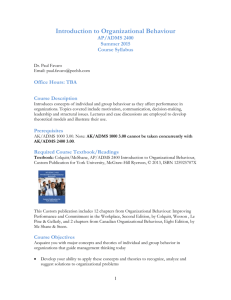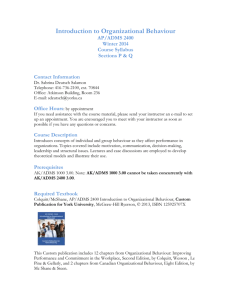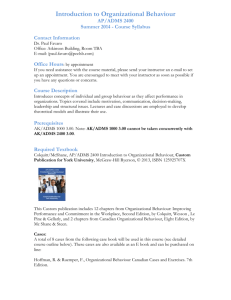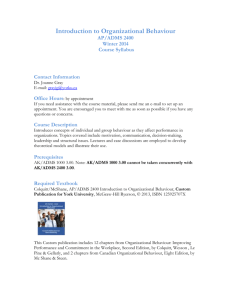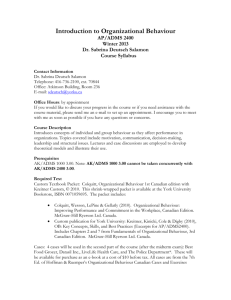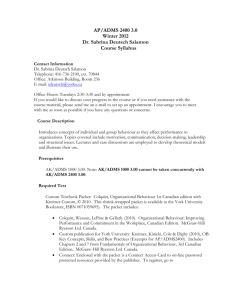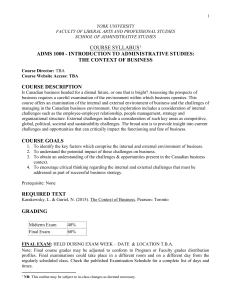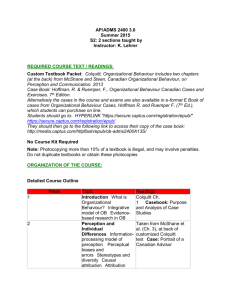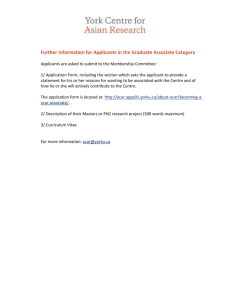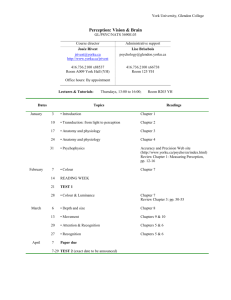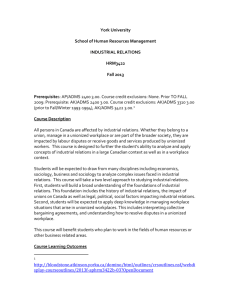WI15 ADMS 2400R Course Outline
advertisement
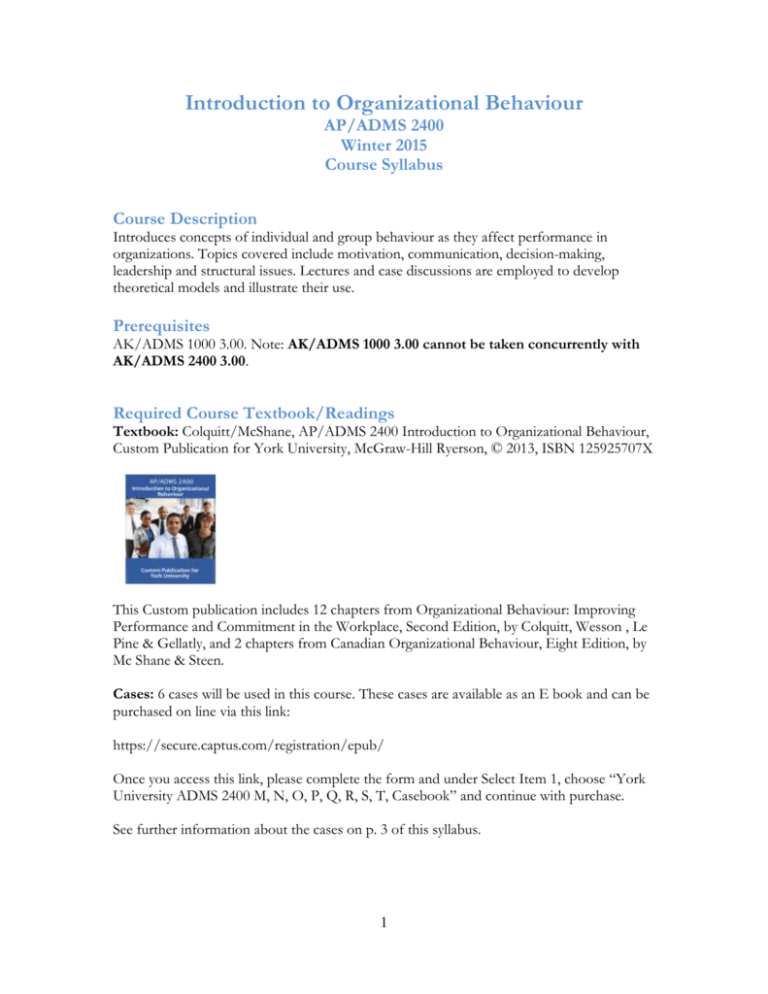
Introduction to Organizational Behaviour AP/ADMS 2400 Winter 2015 Course Syllabus Course Description Introduces concepts of individual and group behaviour as they affect performance in organizations. Topics covered include motivation, communication, decision-making, leadership and structural issues. Lectures and case discussions are employed to develop theoretical models and illustrate their use. Prerequisites AK/ADMS 1000 3.00. Note: AK/ADMS 1000 3.00 cannot be taken concurrently with AK/ADMS 2400 3.00. Required Course Textbook/Readings Textbook: Colquitt/McShane, AP/ADMS 2400 Introduction to Organizational Behaviour, Custom Publication for York University, McGraw-Hill Ryerson, © 2013, ISBN 125925707X This Custom publication includes 12 chapters from Organizational Behaviour: Improving Performance and Commitment in the Workplace, Second Edition, by Colquitt, Wesson , Le Pine & Gellatly, and 2 chapters from Canadian Organizational Behaviour, Eight Edition, by Mc Shane & Steen. Cases: 6 cases will be used in this course. These cases are available as an E book and can be purchased on line via this link: https://secure.captus.com/registration/epub/ Once you access this link, please complete the form and under Select Item 1, choose “York University ADMS 2400 M, N, O, P, Q, R, S, T, Casebook” and continue with purchase. See further information about the cases on p. 3 of this syllabus. 1 Course Objectives Acquaint you with major concepts and theories of individual and group behavior in organizations that guide management thinking today Develop your ability to apply these concepts and theories to recognize, analyze and suggest solutions to organizational problems Assist you in developing skills that will help you become a successful and contributing member of an organization (manager or otherwise) These objectives will be accomplished through lectures, class discussions, exercises and inclass group work. Course Evaluation Mid-Term Examination: 40% The mid-term examination will be held on Sunday Feb. 8, 2015 2:00 - 4:30 pm. Please mark your calendar. The mid-term exam is a closed-book exam covering material discussed in class, including exercises, videos, cases and class discussions, as well as the relevant material in the textbook. Please note: Students who have missed the midterm exam must notify their course director by email no later than 12 noon on Wednesday, February 11, 2015. They are also expected to submit an Attending Physician's Statement form for their absence to the main office at Atkinson 282 no later than Friday, February 13th at 4pm. (please note: A “Doctor’s Note” will not be accepted). Failure to do the above will result in a mark of zero on the midterm exam. The weight of the Midterm Examination cannot be transferred to the Final Examination. Final Examination: 60% The exam will be held during the formal examination period for the semester. The final exam is a closed-book exam so you cannot bring any material into the exam. Further information will be provided prior to the exam date. Students are required to present their current sessional identification card, and their York Card or one piece of photo identification at the midterm and final exams. 2 Detailed Schedule Topic Readings & Cases1,2 1 Introduction Colquitt et al. Ch. 1 2 Behavioural Outcomes 3 Individual Differences & Perception 4 Attitudes, Moods and Emotions Colquitt et al. Ch. 2 Colquitt et al. Ch. 3 (only withdrawal behaviour pp.61-66) Case: Flexible Packaging Colquitt et al. Ch. 9 , McShane & Steen Ch.3 (at the end of customized textbook, pp.361-381 as per number at the bottom of the page) Colquitt et al. Ch. 3 (except pp.61-66) Colquitt et al. Ch. 4 Case: Best Food Grocer 5 Motivation Week Colquitt et al. Ch. 6 Case: Returned Goods Midterm Exam Sunday Feb 8, 2:00 - 4:30 pm 6 Communicating in Teams and Organizations McShane & Steen Ch.9 (at back of customized textbook, pp. 391-411 as per number at the bottom of the page) Case: Livelife Health Care Winter Term Reading Week (Feb 14th-20th) 7 Organizational Trust & Justice Colquitt et al. Ch. 7 (pp.166-180 only) Case: The Police Department 8 Teams Characteristics and Processes Colquitt et al. Ch. 10 9 Decision Making Colquitt et al. Ch. 8 10 Power, Influence & Negotiation Colquitt et al. Ch. 11 Case: Central Prairie Hospital 11 Leadership Styles & Behaviours Colquitt et al. Ch.12 12 Organizational Culture & Socialization Colquitt et al. Ch.14 1 Instructors may change order of cases and additional cases may be discussed in class All cases are from Hoffman, R. & Ruemper, F., Organizational Behaviour Canadian Cases and Exercises 7th Edition. Only “The Police Department” is in the 6th Ed. 2 3 RELEVANT UNIVERSITY REGULATIONS Deferred standing may be granted to students who are unable to write their final examination at the scheduled time or to submit their outstanding course work on the last day of classes. In order to apply for deferred standing, students must complete a Deferred Standing Agreement (DSA) form and submit their request no later than five (5) business days from the date of the exam. The request must be properly submitted with supporting documentation directly to the main office of the School of Administrative Studies (282 Atkinson), NOT to the Course Director. These requests will be considered on their merit and decisions will be made available to the students by the main office in the School's web site (under the heading of 'Links'), no individualized communication will be sent by the School to the students (no letter or e-mails). The status of the DSA submitted shall be checked at: http://apps.eso.yorku.ca/apps/adms/deferredexams.nsf Students with approved DSA will be able to write their deferred examination during the School's deferred examination period. No further extensions of deferred exams shall be granted. The format and covered content of the deferred examination may be different from that of the originally scheduled examination. The deferred exam may be closed book, cumulative and comprehensive and may include all subjects/topics of the textbook whether they have been covered in class or not. Any request for deferred standing on medical grounds must include an Attending Physician's Statement form; a “Doctor’s Note” will not be accepted. DSA Form: http://www.registrar.yorku.ca/pdf/deferred_standing_agreement.pdf Attending Physician's Statement form: http://www.yorku.ca/laps/council/students/documents/APS.pdf Academic Honesty: The Faculty of Liberal Arts and Professional Studies considers breaches of the Senate Policy on Academic Honesty to be serious matters. To quote the Senate Policy on Academic Honesty. The Policy on Academic Honesty is an affirmation and clarification for members of the University of the general obligation to maintain the highest standards of academic honesty. As a clear sense of academic honesty and responsibility is fundamental to good scholarship, the policy recognizes the general responsibility of all faculty members to foster acceptable standards of academic conduct and of the student to be mindful of and abide by such standards. Suspected breaches of academic honesty will be investigated and charges shall be laid if reasonable and probable grounds exist. Students should review the York Academic Honesty policy for themselves at: http://www.yorku.ca/secretariat/policies/document.php?document=69 Students might also wish to review the interactive on-line Tutorial for students on academic integrity, at: http://www.yorku.ca/tutorial/academic_integrity/ Grading Scheme and Feedback Policy: The grading scheme (i.e. kinds and weights of assignments, essays, exams, etc.) shall be announced, and be available in writing, within the first two weeks of class, and, under normal circumstances, graded feedback worth at least 15% of the final grade for Fall, Winter or Summer Term, and 30% for ‘full year’ courses offered in the Fall/Winter Term be received by students in all courses prior to the final withdrawal date from a course. 4 Note: Under unusual and/or unforeseeable circumstances which disrupt the academic norm, instructors are expected to provide grading schemes and academic feedback in the spirit of these regulations, as soon as possible. For more information on the Grading Scheme and Feedback Policy, please visit: http://www.yorku.ca/secretariat/policies/document.php?document=86 In-Class Tests and Exams - the 20% Rule: For all Undergraduate courses, except those which regularly meet on Friday evening or on a weekend, tests or exams worth more than 20% will not be held in the two weeks prior to the beginning of the official examination period. For further information on the 20% Rule, please visit: http://www.yorku.ca/secretariat/policies/document.php?document=141 For further information on examination scheduling and other important dates, please refer to: http://www.registrar.yorku.ca/enrol/dates/index.htm Reappraisals: Students may, with sufficient academic grounds, request that a final grade in a course be reappraised (which may mean the review of specific pieces of tangible work). Non-academic grounds are not relevant for grade reappraisals; in such cases, students are advised to petition to their home Faculty. Students are normally expected to first contact the course director to discuss the grade received and to request that their tangible work be reviewed. Tangible work may include written, graphic, digitized, modeled, video recording or audio recording formats, but not oral work. Students need to be aware that a request for a grade reappraisal may result in the original grade being raised, lowered or confirmed. For reappraisal procedures and information, please visit the Office of the Registrar site at: http://www.registrar.yorku.ca/grades/reappraisal/index.htm Accommodation Procedures: LA&PS students who have experienced a misfortune or who are too ill to attend the final examination in an ADMS course should not attempt to do so; they must pursue deferred standing. Other students should contact their home Faculty for information. For further information, please visit: http://www.registrar.yorku.ca/exams/deferred/index.htm Religious Accommodation: York University is committed to respecting the religious beliefs and practices of all members of the community, and making accommodations for observances of special significance to adherents. For more information on religious accommodation, please visit: https://w2prod.sis.yorku.ca/Apps/WebObjects/cdm.woa/wa/regobs Academic Accommodation for Students with Disabilities The nature and extent of accommodations shall be consistent with and supportive of the integrity of the curriculum and of the academic standards of programs or courses. Provided that students have given sufficient notice about their accommodation needs, instructors shall take reasonable steps to accommodate these needs in a manner consistent with the guidelines established hereunder. For more information please visit the Disabilities Services website at http://www.yorku.ca/cds/ 5 York’s disabilities offices and the Registrar’s Office work in partnership to support alternate exam and test accommodation services for students with disabilities at the Keele campus. For more information on alternate exams and tests please visit http://www.yorku.ca/altexams/ Please alert the Course Director as soon as possible should you require special accommodations. 6
